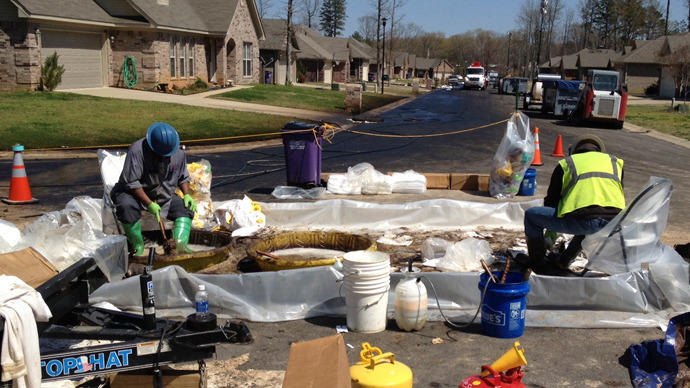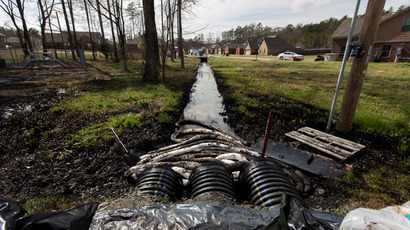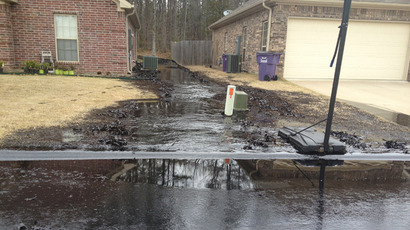'Arkansas oil spill should be nail in the coffin for Keystone pipeline'

Despite the financial and ecological ramifications of the Mayflower oil spill Exxon might be able to avoid paying into a government oil cleanup fund, leaving American taxpayers stuck with the bill.
David Turnbull, the campaign director for Oil Change
International, told RT that the idea of American taxpayers paying
for the cleanup because of a legal loophole for the oil company
responsible is “ludicrous.” He also warned that while
the full environmental effects are yet to be known, the Arkansas
spill should be a clear warning to any politician still
championing the Keystone XL pipeline proposal.
RT:Exxon’s Pegasus pipeline is exempt from
paying into the Oil Spill Liability Fund, which is used for
emergency oil spillages. Why is this the case?
David Turnbull: We need to be clear that Exxon
is not generally exempt from contributing to the Oil Spill
Liability Trust Fund. Rather, Exxon and other companies are
exempt from paying certain taxes for the tar sands oil that they
transport in this country.
The Oil Spill Liability Trust fund is funded by an
8-cent-per-barrel excise tax on domestically produced and
imported crude oil and on imported refined products such as
gasoline. However, the IRS has classified tar sands as different
from conventional oil, and thus the tax levied to fill the
liability trust fund is not levied on tar sands crude. It's a
loophole that should be closed, as it doesn't line up with the
actual intent of the tax or the fund.
The pipeline that is leaking in Arkansas was transporting tar
sands oil, and thus that oil was exempt from the
8-cent-per-barrel excise tax.
RT:The heavy crude carried by the pipeline
contains bitumen. Are bitumen spills considered more dangerous
than ‘conventional oil’ spills? If so, should pipelines carrying
bitumen be expected to contribute to the fund?
DT: Tar sands oil spills, or bitumen spills, are
indeed more dangerous than ‘conventional oil’ spills. We have
already seen the extreme costs and damages of tar sands oil
spills in recent years, most notably in Michigan where an
Enbridge pipeline carrying tar sands in 2010 resulted in the
costliest on-land oil spill in US history.
Given how toxic and dangerous tar sands oil – or bitumen – is,
it’s entirely irrational that this oil would be exempt from being
taxed in order to pay for the Oil Spill Liability Trust Fund. As
these sorts of heavy oils that are exempt from this tax continue
to make up a larger percentage of oil transported in the US, it
will only serve to stretch the fund even further, while putting
families, communities, and ecosystems at greater risk.
RT:What happens in the event that the Oil
Spill Liability Trust Fund runs out of cash? Do US taxpayers have
to foot the bill?
DT: The Oil Spill Liability Trust Fund is
currently stretched thin, owing in a large part to the fact that
there have been some massive oil spills in recent years such as
the BP Deepwater Horizon spill and the tar sands spill in
Michigan both in 2010. If the fund goes broke, the American
taxpayers do indeed foot the cleanup bill should the oil
companies themselves avoid paying the costs directly.
RT:There is very little government
regulation when it comes to pipelines, especially ones that don’t
run through heavily populated or environmentally sensitive areas.
Should Washington implement stricter inspection laws? Could that
have prevented the Arkansas spill?
DT: Congress and the Obama Administration must
pursue greater regulation of the oil industry on all fronts, and
in particular regarding pipeline safety. We’ve seen time and time
again that oil simply cannot be transported safely, and the lack
of regulation only makes this even more problematic. The oil
industry says that building newer pipes will help avoid more
spills and leaks, but the facts say otherwise. In the first year
of operation of the first Keystone pipeline, it spilled 35 times.
On average, there was roughly one oil pipeline spill per day last
year.
The full facts on the Arkansas oil spill are still to be
uncovered – Exxon and the authorities are doing an impressive job
of keeping the press at bay and keeping the details under wraps.
But we can still learn lessons from Arkansas already. Oil, and in
particular tar sands oil, is dangerous when transported as well
as when it’s burned. We need to find an alternative, and we need
to stop building new pipelines like the Keystone XL pipeline.
RT:This comes in the midst of the debate
surrounding the Keystone Pipeline. Do you think the recent spill
will influence’s Obama’s decision on the project? Should it?
DT: The spill in Arkansas should be the nail in
the coffin for the Keystone XL pipeline proposal. It’s yet
another reminder of the dangers inherent in tar sands pipelines.
The Keystone XL pipeline would carry over 8 times as many barrels
of tar sands oil per day than the pipeline spilling in Arkansas.
Imagine the pictures we are seeing of neighborhoods inundated by
toxic tar sands sludge, magnified eight times. That’s a scary
image that we should never have to see in reality.
Follow RT's in-depth day-by-day timeline on the Arkansas oil spill














